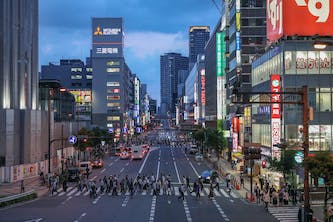In southern India’s Tamil Nadu state, over 1,500 workers at Samsung Electronics’ factory in Chennai have been on strike for the past 11 days, causing significant disruptions in production. The workers are demanding recognition for their newly-formed labor union, the Samsung India Labour Welfare Union (SILWU), to help negotiate for better wages and working conditions with the management. This strike, one of the largest in recent years for Samsung, highlights the workers’ push for improved rights amidst India’s growing importance as a manufacturing hub.
Samsung India has stated that the welfare of its workers is a top priority and that discussions are underway to address the workers’ concerns promptly. The workers, who earn an average of 25,000 rupees per month, are seeking staggered raises totaling a 50% increase over the next three years. They also allege being pressured to work non-stop for extended periods in unsafe conditions. The company denies these allegations, emphasizing compliance with labor laws and regulations.
The workers’ demands include the recognition of their union, the ability to engage in collective bargaining, and the rejection of competing unions, as the majority of the workforce supports SILWU. The strike reflects broader issues of labor rights in India, where multinational companies often face scrutiny for their treatment of workers. Labor economists note that foreign companies may use various strategies to prevent unionization, such as encouraging the formation of internal unions to maintain some control over labor activities.
The situation at Samsung’s Chennai plant underscores the complexities of labor relations in India’s industrial landscape. While the company asserts its commitment to resolving the workers’ concerns, the workers remain steadfast in their demands for better working conditions and fair treatment. As the strike continues, both sides are engaged in discussions to find a resolution that addresses the workers’ grievances and ensures a sustainable and equitable working environment.
In a broader context, the Samsung workers’ protest sheds light on the challenges faced by workers in multinational corporations operating in India. The push for better labor rights and conditions reflects a growing awareness and demand for fair treatment among workers in the country’s industrial sector. As negotiations continue between the workers and the management, the outcome of this strike could have implications for labor practices and policies in India’s manufacturing industry.
Original news source: Why hundreds of Samsung workers are protesting in India (BBC)
🎧 Listen:
Slow
Normal
Fast
📖 Vocabulary:
| 1 | disruptions | Interruptions or disturbances that prevent normal progress |
| 2 | recognition | Acknowledgment or acceptance of something as valid or important |
| 3 | negotiate | To discuss something in order to reach an agreement |
| 4 | allegations | Claims or assertions that someone has done something wrong |
| 5 | compliance | Adherence to rules or standards |
| 6 | collective | Done by people acting as a group |
| 7 | scrutiny | Close examination or inspection |
| 8 | strategies | Plans or methods developed to achieve a goal |
| 9 | underscores | Emphasizes or highlights the importance of something |
| 10 | complexities | Complicated or intricate aspects of a situation |
| 11 | steadfast | Firm and unwavering in purpose or loyalty |
| 12 | grievances | Complaints or expressions of dissatisfaction |
| 13 | sustainable | Able to be maintained or continued over the long term |
| 14 | equitable | Fair and impartial treatment |
| 15 | implications | Possible effects or consequences of an action or decision |
Group or Classroom Activities
Warm-up Activities:
– News Summary
Instructions: Ask students to summarize the key points of the article in their own words, highlighting the main ideas and important details. Encourage them to focus on the workers’ demands, Samsung’s response, and the broader implications of the strike.
– Opinion Poll
Instructions: Divide the class into groups and have them conduct an opinion poll on whether they support the Samsung workers’ strike or Samsung management’s position. Each group should come up with reasons to support their stance based on the information provided in the article. After the discussion, groups can present their findings to the class.
– Word Association
Instructions: Provide students with key words from the article such as “strike,” “union,” “wages,” “labor rights,” and “negotiation.” Ask them to brainstorm related words, concepts, or phrases for each word. This activity will help reinforce vocabulary from the article and expand their word associations.
– Pros and Cons
Instructions: Have students create a list of pros and cons for both the Samsung workers and Samsung management in the current labor dispute. Encourage them to think critically about the implications of the strike on both parties and consider the potential outcomes of the negotiations.
– Future Predictions
Instructions: In groups, ask students to predict the future outcomes of the Samsung workers’ strike. They should consider possible resolutions, the impact on labor practices in India, and the long-term effects on Samsung’s operations in the country. Each group can present their predictions to the class and discuss the likelihood of each scenario.
🤔 Comprehension Questions:
1. What are the main demands of the workers at Samsung Electronics’ factory in Chennai?
2. How does the strike at Samsung’s factory in Chennai reflect broader issues of labor rights in India?
3. What strategies do labor economists suggest foreign companies might use to prevent unionization in India?
4. How does Samsung India respond to the allegations made by the striking workers regarding working conditions?
5. Why is the recognition of the Samsung India Labour Welfare Union (SILWU) important to the workers?
6. What is the average monthly income of the workers at Samsung’s Chennai plant, and what percentage increase are they seeking over the next three years?
7. How does the strike at Samsung’s factory in Chennai highlight the complexities of labor relations in India’s industrial landscape?
8. What potential implications could the outcome of the strike at Samsung’s factory have on labor practices and policies in India’s manufacturing industry?
Go to answers ⇩
🎧✍️ Listen and Fill in the Gaps:
In southern India’s Tamil Nadu state, over 1,500 (1)______ at (2)______ Electronics’ factory in Chennai have been on strike for the past 11 days, causing significant disruptions in production. The workers are demanding recognition for their newly-formed labor union, the Samsung India Labour Welfare Union (SILWU), to help negotiate for better wages and working conditions with the (3)______. This strike, one of the largest in recent years for Samsung, highlights the workers’ push for improved rights amidst India’s growing importance as a manufacturing hub.
Samsung India has stated that the (4)______ of its workers is a top priority and that discussions are underway to address the workers’ concerns promptly. The workers, who earn an average of 25,000 rupees per month, are seeking staggered raises (5)______ a 50% increase over the next three years. They also allege being pressured to work non-stop for extended periods in unsafe conditions. The company denies these (6)______, emphasizing compliance with labor laws and regulations.
The workers’ demands include the recognition of their union, the ability to engage in collective (7)______, and the rejection of competing unions, as the majority of the workforce supports (8)______. The strike reflects broader issues of (9)______ rights in India, where multinational companies often face scrutiny for their treatment of workers. (10)______ economists note that (11)______ companies may use various strategies to prevent unionization, such as encouraging the formation of internal unions to maintain some control over labor activities.
The situation at Samsung’s Chennai plant underscores the complexities of labor relations in India’s industrial landscape. While the company asserts its commitment to resolving the workers’ concerns, the workers remain steadfast in their demands for better (12)______ conditions and fair treatment. As the strike continues, both sides are engaged in discussions to find a (13)______ that addresses the workers’ grievances and ensures a sustainable and (14)______ working environment.
In a broader context, the Samsung workers’ protest sheds light on the challenges faced by workers in multinational corporations operating in India. The push for better labor rights and conditions (15)______ a growing awareness and demand for fair treatment among workers in the country’s industrial sector. As negotiations continue between the workers and the management, the outcome of this (16)______ could have implications for labor practices and policies in India’s manufacturing industry.
Go to answers ⇩
💬 Discussion Questions:
Students can ask a partner these questions, or discuss them as a group.
1. What is the significance of having a labor union in a workplace?
2. How would you feel if you were a worker at Samsung’s Chennai plant during this strike?
3. Do you think multinational companies have a responsibility to ensure fair treatment of their workers in all countries where they operate? Why or why not?
4. What challenges do you think workers face when trying to improve their working conditions in a multinational corporation?
5. Do you believe that strikes are an effective way for workers to negotiate for better wages and conditions? Why or why not?
6. How do you think the situation at Samsung’s Chennai plant reflects broader issues of labor rights in India?
7. What role do you think labor unions play in advocating for workers’ rights in a country’s industrial sector?
8. Do you think it is fair for workers to demand a 50% increase in wages over three years? Why or why not?
9. How do you think the outcome of this strike could impact labor practices and policies in India’s manufacturing industry?
10. What are some potential consequences for workers who participate in strikes, especially in countries where labor rights are not strongly protected?
11. Why do you think multinational companies may try to prevent unionization among their workers?
12. How important do you think it is for workers to have the ability to engage in collective bargaining with their employers?
13. Do you think the demands of the Samsung workers are reasonable considering the conditions they allege they are working in? Why or why not?
14. How do you think the management at Samsung could improve communication and relations with their workers to prevent strikes in the future?
15. In your opinion, what measures should be in place to ensure a sustainable and equitable working environment for all employees, especially in multinational corporations?
Individual Activities
📖💭 Vocabulary Meanings:
Match each word to its meaning.
Words:
1. disruptions
2. recognition
3. negotiate
4. allegations
5. compliance
6. collective
7. scrutiny
8. strategies
9. underscores
10. complexities
11. steadfast
12. grievances
13. sustainable
14. equitable
15. implications
Meanings:
(A) Able to be maintained or continued over the long term
(B) Plans or methods developed to achieve a goal
(C) Possible effects or consequences of an action or decision
(D) Adherence to rules or standards
(E) Firm and unwavering in purpose or loyalty
(F) Claims or assertions that someone has done something wrong
(G) Fair and impartial treatment
(H) Acknowledgment or acceptance of something as valid or important
(I) Interruptions or disturbances that prevent normal progress
(J) Done by people acting as a group
(K) To discuss something in order to reach an agreement
(L) Close examination or inspection
(M) Complicated or intricate aspects of a situation
(N) Complaints or expressions of dissatisfaction
(O) Emphasizes or highlights the importance of something
Go to answers ⇩
🔡 Multiple Choice Questions:
1. What is the name of the newly-formed labor union at Samsung Electronics’ factory in Chennai?
(a) Chennai Workers Union (CWU)
(b) Samsung India Labour Welfare Union (SILWU)
(c) Tamil Nadu Labor Association (TNLA)
(d) Southern India Labor Coalition (SILC)
2. How long have the workers at Samsung Electronics’ factory in Chennai been on strike?
(a) 11 days
(b) 5 days
(c) 20 days
(d) 15 days
3. What is the main demand of the workers on strike at Samsung’s Chennai plant?
(a) Recognition of their union
(b) Increase in company profits
(c) Reduction in work hours
(d) Removal of labor laws
4. How much of a raise are the workers seeking over the next three years?
(a) 25%
(b) 75%
(c) 100%
(d) 50%
5. What do labor economists mention as a strategy used by foreign companies to prevent unionization?
(a) Supporting workers’ rights
(b) Encouraging the formation of internal unions
(c) Advocating for fair wages
(d) Allowing unlimited breaks
6. What is one of the workers’ demands regarding unionization?
(a) Elimination of all unions
(b) No interaction with management
(c) Ability to engage in collective bargaining
(d) Acceptance of multiple competing unions
7. What is Samsung India’s response to the workers’ concerns?
(a) Ignoring the demands of the workers
(b) Removing all labor laws
(c) The welfare of its workers is a top priority
(d) Decreasing workers’ wages
8. What broader implications could the outcome of the strike at Samsung’s Chennai plant have?
(a) No impact on labor rights in India
(b) Decrease in workers’ awareness
(c) Increase in worker exploitation
(d) Implications for labor practices and policies in India’s manufacturing industry
Go to answers ⇩
🕵️ True or False Questions:
1. The outcome of the strike at Samsung’s Chennai plant could have no implications for labor practices and policies in India’s manufacturing industry.
2. The strike does not reflect broader issues of labor rights in India, where multinational companies face scrutiny for their treatment of workers.
3. Samsung India has stated that the welfare of its workers is a top priority and discussions are ongoing to address the workers’ concerns.
4. The workers are seeking staggered raises totaling a 50% increase over the next three years.
5. Over 1,500 workers at Samsung Electronics’ factory in Chennai, India, have been on strike for the past 11 days.
6. The workers allege being pressured to work non-stop for extended periods in unsafe conditions, which the company denies.
7. The workers are NOT demanding recognition for their newly-formed labor union, the Samsung India Labour Welfare Union (SILWU), to negotiate for better wages and working conditions.
8. The strike at Samsung’s Chennai plant is not one of the largest in recent years for the company.
Go to answers ⇩
📝 Write a Summary:
Write a summary of this news article in two sentences.
Check your writing now with the best free AI for English writing!
Writing Questions:
Answer the following questions. Write as much as you can for each answer.
Check your answers with our free English writing assistant!
1. What are the main demands of the Samsung Electronics workers in Chennai who have been on strike for the past 11 days?
2. How does Samsung India respond to the allegations made by the workers regarding their working conditions and treatment?
3. What broader issues of labor rights in India are highlighted by the strike at Samsung’s Chennai plant?
4. How do labor economists suggest that multinational companies may try to prevent unionization in India?
5. What implications could the outcome of the strike at Samsung Electronics’ factory in Chennai have on labor practices and policies in India’s manufacturing industry?
✅ Answers
🤔✅ Comprehension Question Answers:
1. What are the main demands of the workers at Samsung Electronics’ factory in Chennai?
– The main demands of the workers include recognition for their newly-formed labor union, SILWU, better wages, and improved working conditions.
2. How does the strike at Samsung’s factory in Chennai reflect broader issues of labor rights in India?
– The strike reflects broader issues of labor rights in India by highlighting the workers’ push for improved rights in a country where multinational companies often face scrutiny for their treatment of workers.
3. What strategies do labor economists suggest foreign companies might use to prevent unionization in India?
– Labor economists suggest that foreign companies may use strategies like encouraging the formation of internal unions to maintain some control over labor activities and prevent unionization.
4. How does Samsung India respond to the allegations made by the striking workers regarding working conditions?
– Samsung India denies the allegations made by the workers, emphasizing compliance with labor laws and regulations and stating that discussions are underway to address the workers’ concerns promptly.
5. Why is the recognition of the Samsung India Labour Welfare Union (SILWU) important to the workers?
– The recognition of SILWU is important to the workers as it would allow them to engage in collective bargaining and negotiate for better wages and working conditions with the management.
6. What is the average monthly income of the workers at Samsung’s Chennai plant, and what percentage increase are they seeking over the next three years?
– The workers at Samsung’s Chennai plant earn an average of 25,000 rupees per month and are seeking staggered raises totaling a 50% increase over the next three years.
7. How does the strike at Samsung’s factory in Chennai highlight the complexities of labor relations in India’s industrial landscape?
– The strike at Samsung’s Chennai plant highlights the complexities of labor relations in India by showcasing the challenges faced by workers in multinational corporations and the ongoing negotiations between workers and management.
8. What potential implications could the outcome of the strike at Samsung’s factory have on labor practices and policies in India’s manufacturing industry?
– The outcome of the strike at Samsung’s factory could have implications for labor practices and policies in India’s manufacturing industry by potentially setting precedents for fair treatment and improved labor rights among workers in multinational corporations.
Go back to questions ⇧
🎧✍️✅ Listen and Fill in the Gaps Answers:
(1) workers
(2) Samsung
(3) management
(4) welfare
(5) totaling
(6) allegations
(7) bargaining
(8) SILWU
(9) labor
(10) Labor
(11) foreign
(12) working
(13) resolution
(14) equitable
(15) reflects
(16) strike
Go back to questions ⇧
📖💭✅ Vocabulary Meanings Answers:
1. disruptions
Answer: (I) Interruptions or disturbances that prevent normal progress
2. recognition
Answer: (H) Acknowledgment or acceptance of something as valid or important
3. negotiate
Answer: (K) To discuss something in order to reach an agreement
4. allegations
Answer: (F) Claims or assertions that someone has done something wrong
5. compliance
Answer: (D) Adherence to rules or standards
6. collective
Answer: (J) Done by people acting as a group
7. scrutiny
Answer: (L) Close examination or inspection
8. strategies
Answer: (B) Plans or methods developed to achieve a goal
9. underscores
Answer: (O) Emphasizes or highlights the importance of something
10. complexities
Answer: (M) Complicated or intricate aspects of a situation
11. steadfast
Answer: (E) Firm and unwavering in purpose or loyalty
12. grievances
Answer: (N) Complaints or expressions of dissatisfaction
13. sustainable
Answer: (A) Able to be maintained or continued over the long term
14. equitable
Answer: (G) Fair and impartial treatment
15. implications
Answer: (C) Possible effects or consequences of an action or decision
Go back to questions ⇧
🔡✅ Multiple Choice Answers:
1. What is the name of the newly-formed labor union at Samsung Electronics’ factory in Chennai?
Answer: (b) Samsung India Labour Welfare Union (SILWU)
2. How long have the workers at Samsung Electronics’ factory in Chennai been on strike?
Answer: (a) 11 days
3. What is the main demand of the workers on strike at Samsung’s Chennai plant?
Answer: (a) Recognition of their union
4. How much of a raise are the workers seeking over the next three years?
Answer: (d) 50%
5. What do labor economists mention as a strategy used by foreign companies to prevent unionization?
Answer: (b) Encouraging the formation of internal unions
6. What is one of the workers’ demands regarding unionization?
Answer: (c) Ability to engage in collective bargaining
7. What is Samsung India’s response to the workers’ concerns?
Answer: (c) The welfare of its workers is a top priority
8. What broader implications could the outcome of the strike at Samsung’s Chennai plant have?
Answer: (d) Implications for labor practices and policies in India’s manufacturing industry
Go back to questions ⇧
🕵️✅ True or False Answers:
1. The outcome of the strike at Samsung’s Chennai plant could have no implications for labor practices and policies in India’s manufacturing industry. (Answer: False)
2. The strike does not reflect broader issues of labor rights in India, where multinational companies face scrutiny for their treatment of workers. (Answer: False)
3. Samsung India has stated that the welfare of its workers is a top priority and discussions are ongoing to address the workers’ concerns. (Answer: True)
4. The workers are seeking staggered raises totaling a 50% increase over the next three years. (Answer: True)
5. Over 1,500 workers at Samsung Electronics’ factory in Chennai, India, have been on strike for the past 11 days. (Answer: True)
6. The workers allege being pressured to work non-stop for extended periods in unsafe conditions, which the company denies. (Answer: True)
7. The workers are NOT demanding recognition for their newly-formed labor union, the Samsung India Labour Welfare Union (SILWU), to negotiate for better wages and working conditions. (Answer: False)
8. The strike at Samsung’s Chennai plant is not one of the largest in recent years for the company. (Answer: False)
Go back to questions ⇧















